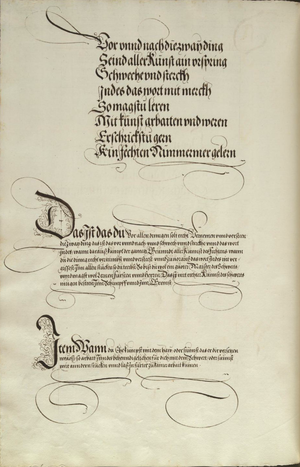|
|
You are not currently logged in. Are you accessing the unsecure (http) portal? Click here to switch to the secure portal. |
User:Kendra Brown/Latin Lew/Piece 008
Contents
Dresden
German
Transcription
[1] Vor vnnd nach diezway ding
Seind aller kunst ein vrspring
Schweche vnd sterckh
Indes das wort mit merckh
So magstu leren
Mit kunst arbaiten vnd weren
Erschrickstu gern
Kain fechten Nimmermer gelern
Das ist das du Vor allen dinngen solt recht Vernemen vnnd versteen. die zway ding / das ist das vor vnnd das nach. vnnd schwech vnnd sterckhe / vnnd das wort Indes / wann darausz kumpt der ganntz Grvnndt aller kunnst des fechtens / wann du die dinng recht vernimbst vnnd versteest / vnnd zuuorausz das wort Indes nit vergissest / Inn allen stucken so du treibst / So bist du wol ein guoter Maister des Schwerts / vnnd magst wol Lernen fursten vnnd herren / Das sy mit rechter Kunnst des schwerts mugen besteen Inn schImpff vnnd Inn Ernnst.
Sandbox German
- Vor vnnd nach die zwaÿ ding
- Seind aller Kunst ain vrspring
- Schweche vnd sterckh
- Indes das wort mit merckh
- So magstu leren
- Mit kunst arbaiten vnd weren
- Erschrickstu[1] gern
- Kain fechten Nimmer mer gelern
- Das Ist das du Vor allen dinngen solt recht Vernemen vnnd versteen,
- die zway ding,
- das ist das vor vnnd nach,
- vnnd schwech vnnd sterckhe,
- vnnd das wort Indes /
- wann darauß kumpt der ganntz Grunndt aller Kunnst des Fechtens,
- wann du die dinng recht vernimbst vnnd versteest,
- vnnd zu uorauß das wort Indes nit vergissest,
- Inn allen stucken so du treibst,
- So bist du wol ein guoter Maister des Schwerts /
- vnnd magst wol Lernen Fursten vnnd Herren,
- Das sÿ mit rechter Kunnst des schwerts mugen besteen Inn Schimpff[2] vnnd Inn Ernnst /
English
Sandbox English from German
- Before and after, these two things
- are the origin of all art
- Weak and strong
- Indes, take note with [the former] of that word
- You can thus learn
- to work and defend with skill.
- If you are easily frightened,
- then you will never learn any fencing
- There is that, which you should comprehend and understand before all others,
- the two things,
- which are the Before and After,
- and the Weak and Strong,
- and the word Indes.[3]
- Because the entire foundation of all fencing arts arises from these.
- If you correctly comprehend and understand these things,
- and, in advance, do not forget the word Indes
- in all of the sequences that you carry out,
- then you are surely a good Master of the Sword,
- and can teach princes and lords well,
- so that they can endure/prevail by using the correct art of the sword in play and in earnest.
Smooth English from German
There are two things, which you should comprehend and understand before everything else, which are the Before and After, and the Weak and Strong, and the word Indes.* Because the entire foundation of all fencing arts arises from these. If you correctly comprehend and understand these things (never forgetting the word Indes in all of the sequences that you carry out), then you are surely a good Master of the Sword, and can teach princes and lords well, so that they can endure/prevail by using the correct art of the sword in play and in earnest.
Munich
Latin
Transcription
[4] In gladiatoria optimum est, ut observes,
Sandbox Latin
- In gladiatoria optimum est,
English
Sandbox English from Latin
- In fighting it is best,
Smooth English from Latin
Placeholder text
Notes
- So the Latin translator noped out of indes, before, after, strong and weak here (even though later in the text he is willing to work with everything but indes).
- Latin 81v-c (8c) does not match german 85v-b at all-- line 2.5-5 might match 85v-c (item wann du ehe...) and line 6 onward might match 86r-a
- ↑ This is the intransitive form, so are frightened is correct. The implications are that you are frightened of the preceding, i.e., being hit (weren) and/or work (arbeiten). One or both of which will lead to failure.
- ↑ Schimpf here, as paired with ‘ernst’, means ‘ludus’, that is, play, instead of insult.
- ↑ Indes is its own problem as a disruptive timing element.

